Damon Gulczynski’s New York Times crossword—Amy’s write-up
Damon! Where’d your middle initial go? I thought your bylines usually had the J. Lots to like in this puzzle above/below the byline, of course. We get [Anagrams] for the first clue (SCRAMBLES), fun. [Italian for “sleeves”] to clue MANICOTTI. LENIN’S TOMB and NO TAG-BACKS (we would also have accepted NO BACKSIES, which is also 10 letters). The BLOAT/FATTEN row making us all want to unbutton our pants. Literary [First novel of the Great Plains trilogy], O PIONEERS, and also DESDEMONA. RIC OCASEK, the primary but not only lead singer for the Cars (Ben Orr also sang lead sometimes, as on “Drive”). And another ’80s lead singer whose album I bought, Duran Duran’s Simon LEBON. Names scrabbly (BJORK, GRETZKY) and not (GERALD FORD). Slangy HOT MESS and a lovely WAXES POETIC.
Five things:
- 26a. [Letters in some church names], A.M.E. African Methodist Episcopal. I grew up passing lots of A.M.E. signs alongside the Dan Ryan Expressway on Chicago’s South Side, so I much prefer seeing AME clued this way than as a French word for soul. (We would also have accepted [Nickname for crossword blogger Reynaldo].)
- 23d. [One unlikely to punk out], REAL TROOPER. I will scowl at this one every single time it’s in a crossword. TROUPER! With a U! Come on, people.
- 62a. [Hybrid woman-bird monster], HARPY. This word’s usually clued as the mythical creature, but sometimes it’s clued as a nagging woman. Gotta give the edge to Greek mythology here.
-
8d. [Single-named artist], ERTE. Meh. Raise your hand if you tried to get a 4-letter mononymic musical artist in here.
- 13d. [Kind of blue that’s close to green], ETON. There’s an Eton blue?? Googling … I don’t know how to break it to you, Etonians, but that’s basically a putrid shade of light green that you might expect to find on a ’70s house with dated aluminum siding.
4.2 stars from me.
Jacob Stulberg’s Chronicle of Higher Education crossword, “Crossing the Isle” — pannonica’s write-up
Couple of unusual occurrences regarding this week’s—or-biweek’s—crossword. First, I saw that there were already three ratings for it, totalling a mere two stars. Second, I noticed the title before solving; nothing ostensibly to do with partisanship, though it may turn out to be otherwise in terms of audience reception.
Didn’t love it, but it certainly doesn’t seem that bad.
The revealer is in the center: 37a [Where to find all the parts of the answer to each starred clue] ENGLAND. Hence, place names strung together to create phrases that can be wrestled into a semblance of coherence via creative clue-framing.
- 17a. [*Make a time capsule out of magazines you looked at while luxuriating in bubbles?] BURY BATH READING.
- 23a. [*Potters’ argument over whether to make vases or crocks?] STONE WARE BATTLE.
- 51a. [*Excessively theatrical drum major?] HAM BARKING MARCH.
- 60a. [*What a lingerie-store clerk might to after some haggling?] SETTLE THONG SALE.
Varying levels of dubiousness, to say the least, eh? What I do appreciate is that they’re all 15-letter spanners. It constrains and degrades the accompanying fill, but not to an unreasonable degree.
- Longa latinis: 11d [For the time being] AD INTERIM, 31d [School on a résumé] ALMA MATER.
- 42a [Hindu deity depicted riding a parrot] KAMA. Oh, you bet that needs an illustration. Also, it seems his name is more frequently presented as Kāmadeva. The deva makes explicit the personification of kāma, desire. You know, of Kāma Sutra fame.

- Presumably hackle-raising entries: 57a [Gilbert who wrote 1980s sequels to the works of Lewis Carroll and J.M. Barrie] ADAIR, 28a [Gift recipient] DONEE, 69a [Furtive summons] PSSST, 4d [Kind of preservation in an urban myth about Walt Disney] CRYONIC.
- Less obvious name references: 10a [Italian tennis star Errani] SARA, 48d [Founding patriarch of the Flying Wallendas] KARL, 50d [Painter Schiele who was a protegé of Klimt] EGON.
- 56d [Giant cloud producer of the ’50s] H-TEST. President Obama was in Hiroshima today, presenting a historic speech.
- 27a [Country with the only remaining wild Asiatic cheetahs] IRAN. There are rumors of relict populations in Pakistan, Turkmenistan, and elsewhere, but their existence seems unlikely. It’s speculated that the generic name Acinonyx refers to the non-retractability of their claws, unusual in felids.
Just want to let you know that I generated a map showing all the locations and connecting the triads, but it turned out not to be worth sharing. You’re welcome?
Lynn Lempel’s CrosSynergy/Washington Post crossword, “A Hardscrabble Life” —Ade’s write-up
Good morning, everybody! Hope you’re doing well and getting ready for another fine weekend ahead. Today’s crossword puzzle, brought to us by Ms. Lynn Lempel, takes us into the world of a popular board game, as the first word in each of the four theme entries is also a word that is an element in the game of Scrabble.
- TILE FISH (17A: [Atlantic bottom-feeders found on dinner tables])
- RACK AND PINION (28A: [Pair go fgears, as in a steering mechanism])
- BOARD OF HEALTH (45A: [Group focused on the public’s well-being])
- POINT MAN (62A: [Go-to person])
My old high school biology, chemistry and anatomy professor, who also got me first interested in crossword puzzles, would have a fit if I didn’t get MYELIN off of the bat once seeing the clue (41D: [Insulating sheath around nerves]). Had a devil of time parsing WAPITI in the Northeast (9D: [Rockies roamer otherwise known as an elk]), especially given the fact that it took a whole lot of time to get SWIPES and what that misleading clue was getting at (8A: [Gets credit, in a way]). Much more familiar with hearing a “Brillo Pad” instead of an SOS PAD (6D: [Pot scrubber]). I’ll be using that tomorrow when I make meatballs from scratch tomorrow. To boot, I am glad that I never had to use NODOZ at any time while I was in college to help stay up to study (40D: [Help in pulling an all-nighter]). Something about that made me scared to take it, and scared to sleep in front of my PROFS once I actually entered the classroom the next day (48D: [Many grad student advisers]).
“Sports will make you smarter” moment of the day: ALI (5D: [Athlete who said, “If you even dream of beating me you’d better wake up and apologize]) – Not only is she the daughter of The Greatest, Laila ALI followed in her father’s footsteps, recording a perfect 24-0 career record in the boxing ring in a career spanning from 1999 to 2007. Last September, she achieved another feat: her first one-on-one interview with a certain Field blogger, at the U.S. Open in New York City.
Thank you so much for the time, and have yourself a great Memorial Day weekend! See you tomorrow!
Take care!
Ade/AOK
Roland Huget’s LA Times crossword – Gareth’s write-up
Am I missing something? Because this is not a theme. PEACECORPS / QUIETREVOLUTION and WHISPERJET seem to have a first word that is vaguely similar. PEACE is an mass noun suggesting tranquility; so is QUIET, I guess, though the two aren’t that near each other. Then you have WHISPER, which is not a mass noun, and refers to soft talking. I don’t understand. What is this?
Other remarks:
- [Course designer], CHEF. Excellent clue! Who else was thinking along the lines of PETEDYE?
- [Virna of “How to Murder Your Wife”] LISI is not a name I knew, and its crossing with [One of many in “Oprhan Black”] CLONE may be tricky for many. I won the coin flip with CRONE!
- The TEMPI/ONEPM/TOPO/ENOL corner seems strangely subpar.
- [Locks in a zoo], MANE. Another good misdirection.
- [Avid surfers], NETIZENS. I think this word was last used ca. 2006?
- [Money-saving refuge], TAXHAVEN. The US is quickly becoming the world’s biggest…
- [Quattro competitor], ATRA and [Quattro, e.g.], AUDI – the tricky clecho saves ATRA’s bacon!
- [Sixth of five?], ESP. Another fun clue!
No rating as I’m sure I must be missing something…
Gareth
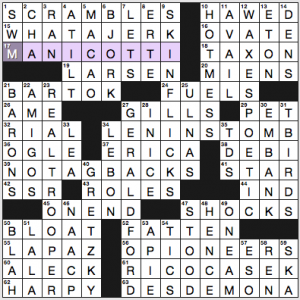
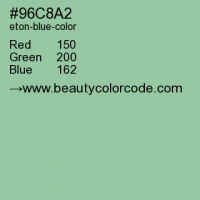
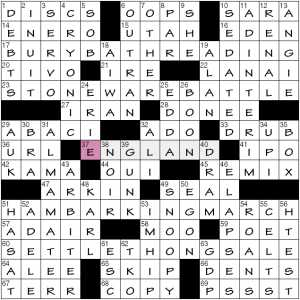
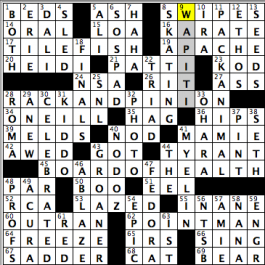

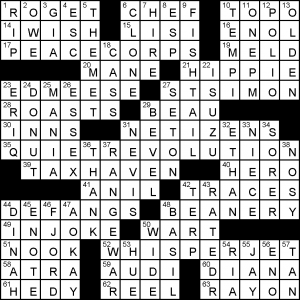
I liked everything about the puzzle except the crossing of Ric Ocas_k and R_n.
I was so fascinated by the 11-year-old speller tonight that I skipped much of the basketball game. It is interesting to read about the various rationales for why Indian-American kids have dominated for many years.
Steve
The phrase looked for in 23D is “REAL TROUPER,” not “real trooper.” This is an error, pure and simple. I pray that the constructor and Mr. Shortz will not offer a convoluted argument why “trooper” is an acceptable alternative, because they would be wrong and would be engaging in sophistry. The error needs to be acknowledged.
This is the third time that WS has clued TROOPER this way. He has heard from purists each time. He obviously disagrees with your assessment.
In fact, M-W support the clue. The line
3: TROUPER 2
means that “trooper” is used as a synonym for this sense of “trouper.”
Being in the dictionary doesn’t mean you have to like a usage, but it does mean you can’t describe it as “an error, pure and simple.”
The fact that M-W, as you have found, gives a third definition of “trooper” as “trouper” demonstrates the opposite of what you seem to think it does, Martin. It indicates that this third definition is a variant, and that “trouper” is the word to be referred to for this meaning. The fact that this third definition exists does show that language changes and that wide usage is at some point acknowledged by dictionaries, not exactly at a uniform pace. That does does not mean that the ship has sailed and can’t come back, as you say below. Variants are allowed in NYT puzzles on weekends, apparently, but they don’t have to be encouraged. They are still variants.
Mr. Gulczynski shows on his website that when he Googled “real trouper,” the Google page asked him whether he was looking for “real trooper.” The page is not some discerning editor trying to point him in the right direction. The question was automatically generated, because of the apparently now-wider use of the “trooper” spelling. That does not mean that a more knowledgeable segment of readers and users does not know which usage is still preferred:
http://grammarist.com/spelling/trooper-or-trouper/
The number of hits is not an automatic answer for all usage questions. That’s why we have dictionaries and usage guides.
For that matter, it’s not true that once a ship has sailed, it can’t come back. A few decades ago, the word “minuscule” was probably more often seen as “miniscule.” Now, with spellcheck, that and other words are far more often seen with their “correct” spellings. Currently, verbs are often seen with the wrong forms, such as “sprung” and “shrunk” for the regular past tense, not participles, even on the editorial page of the New York Times. Perhaps in the future, checks of grammar will be more sophisticated and easier and the “correct” forms will come back, too. On the other hand, currently, you would not want to give over control of your text to these tools. In this case, an example would be the Google question: “Did you mean real trooper?”
Nobody’s arguing you shouldn’t use “real trouper.” Just that you shouldn’t be denigrating people who use “real trooper” as somehow ignorant. I don’t follow your logic about the third sense of trooper (= “real trouper”) makes it a variant. It’s not a variant spelling (which is what variant means). It’s another meaning of the idiom, informed by the older one and making perfect sense. And, yes, it’s now the preferred one.
It’s a different situation than a misspelling like “miniscule.” It’s a perfectly reasonable phrase, honoring the dependability of soldiers to their platoon-mates.
I will continue to use “real trouper.” But I don’t see any reason to object to the alternative.
You might be correct that trouper is more grammatically acceptable than trooper, but “real trooper” is an idiom in common language in a way that “real trouper” is not. The entry isn’t meant to be grammatically correct; it’s meant to be a phrase people actually use.
For example, YER OUT has appeared in several puzzles. Would you complain that it should be YOU ARE OUT? Probably not because the former is an actual saying in a way that the latter isn’t. In this case, it’s not about being grammatically correct; it’s about coming up with a colorful entry that is a part of our everyday lexicon.
In fairness to the purists, it’s not about grammar (or slang), but about the expression’s origin. There’s no doubt it originally referred to “the show must go on” mentality. People heard it as the “I’ve got your back” kind of dependability that military units are built on, and thought that was the intended idiom.
Although it began as an error, “real trooper” is now the more common phrase because it makes even more sense. The show is important but it’s not life-or-death.
That’s how language works. Once a ship has sailed, it can’t come back.
Never heard of ETON blue and, yeah, it’s totally not blue. But I guess they’re Eton and they can call it whatever they like.
I didn’t know NOTAGBACKS, but it was easy to guess. I also don’t know “no backsies,’ on account of my non-American childhood, I guess.
INICE seems completely unidiomatic, as clued. We have beer in ice — and here’s a pick so you can hack out a can for yourself. “How some mammoths were preserved” would be better.
I liked the musical crossing of BARTOK and BJORK. They could have done some interesting stuff together…
Re: Omission of author’s middle initial in NYT puzzle byline
There’s a not-so-interesting story behind this. I used to always use my middle initial in publications, probably because my background is in academia, and in academic papers middle initials are the norm. However, somebody, I don’t even remember who, said that middle initials are pretentious, so I quit using it — just like that I gave in to the slightest bit of criticism that wasn’t even pointed directly at me. Kinda lame now that I think about it. Oh well.
Anyway, thanks for the review, as always. If anybody is interested in extended constructor notes, visit my blog: scrabbledamon.blogspot.com
Let the good times roll!
-DJG
My personal opinion? 36%
(*as opposed to a non-personal opinion)
You are so kind :)
It’s merely for introducing irony; I can’t make such a qualitative assessment, you understand.
Damon/Joe, thanks for sharing your extended notes, I have enjoyed anticipating them when your puzzles run.
My pleasure! I’m very glad you like them.
https://en.wikipedia.org/wiki/Blue%E2%80%93green_distinction_in_language
Not entirely relevant for our time and culture.
and where that green-y “eton blue” is concerned, i’m thinkin’ cyan. though some of the colors in the cyan range appear to be green, they’re blue. technically speaking.
;-)
me too, re CYAN
I’ve noticed over the years that colors that other people describe as blue are distinctly green to me. In the spectrum reproduced in the wiki article, the dividing line between blue and green is clearly in what I see as the green part of the spectrum.
What is the significance of the 3×3 color square at the cyan link? Some of those squares are blue, some are green, and the one in the middle is I-don’t-know-what-to-call-it.
3×3: They represent a sampling of various “cyans”. The two modern archetypal cyans, for instance, are from the projected RGB system and the print-based, CMYK system (also explained at that Wikipedia page).
Interesting — because I don’t see them at all as examples of variations of a single color, but as a bunch of blues and greens.
Exactly.
More or less.
Had to look up “relict”, which isn’t quite the same as “relic”. Turns out the source is Latin and Old French for “person or thing left behind (especially a widow)”, and the word also means “widow” in English, though that usage is archaic.